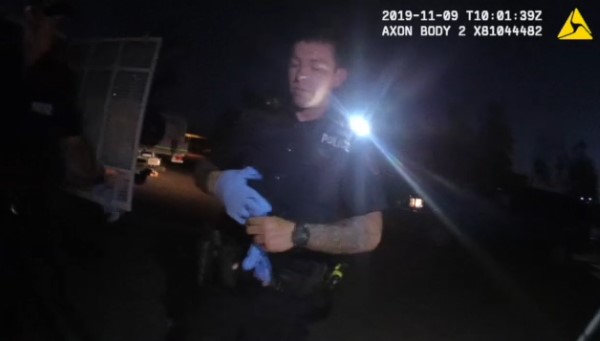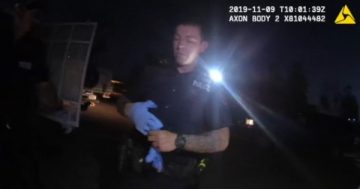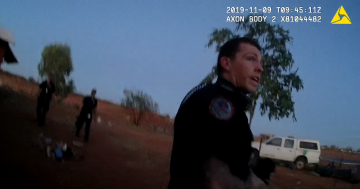
Constable Zachary Rolfe seen in a still from body-worn camera footage that was tendered to the court. Photo: Supplied.
Readers are advised this article contains content some may find distressing.
Canberra-born Constable Zachary Rolfe has told his murder trial he fired on Kumanjayi Walker because he feared for the life of himself and his partner, fellow police officer Adam Eberl.
Mr Rolfe, 30, is currently facing a jury trial in the Northern Territory Supreme Court. He is accused of murdering the 19-year-old Indigenous Australian man in the small desert community of Yuendumu, outside Alice Springs, on 9 November 2019.
Jurors previously heard after Mr Walker stabbed Mr Rolfe in the shoulder with a pair of scissors, Mr Rolfe shot him once, then Mr Walker and Remote Sergeant Eberl got into a struggle. Mr Rolfe then fired two shots into him in what the Crown alleges was a “double-tap”.
He took the stand to defend himself on Wednesday and Thursday (2 and 3 March).
Under questioning from his barrister David Edwardson QC, Mr Rolfe said when he and Remote Sergeant Eberl entered the house and saw Mr Walker, he didn’t recognise him as the man they had been searching for.
“Basically, walking into that house and seeing this man who I didn’t know was Kumanjayi – I didn’t perceive a threat, I just believed we were going to just have a conversation,” he said.
He said he saw both of Mr Walker’s hands were empty at one point and didn’t know he had scissors on him. He confirmed Mr Walker’s identity but said he started resisting being arrested.
Mr Rolfe said Mr Walker hit him, then he saw him holding “a blade in a dagger-like grip” – which were the scissors – that he used to stab him in the shoulder.
“As soon as I saw him with the blade, I immediately feared for my life. And instinctively, I went for my Glock,” he said.
He stepped back, thought he saw Remote Sergeant Eberl being stabbed, so he shot Mr Walker once in his centre of mass, but said after the shot, Mr Walker was not incapacitated.
He said Mr Walker and Remote Sergeant Eberl fell to the ground, fighting, and he thought he saw Mr Walker stabbing his partner.
“I was in fear for my partner’s life and I needed to incapacitate the threat immediately by the use of my firearm,” he said.
Mr Rolfe said he fired twice more into Mr Walker’s centre of mass and believed he saw Mr Walker stop trying to stab his partner.
“I was following my training when confronted with an edged weapon, and being in fear for my life, my partner’s life. And instinctively, I went for my firearm,” he said.
Under cross-examination from Crown Prosecutor Philip Strickland SC, he said the last two shots he fired weren’t a double-tap, but two shots fired in quick succession in close to point-blank range.
Mr Rolfe told the court he had been trained to fire at an armed offender’s centre of mass – when seeing a person’s whole body, this would mean firing at their torso – and to “shoot until the threat is incapacitated” when confronted with an edged weapon, “no matter how many rounds that takes”, he said.
Mr Rolfe said he watched footage of the so-called “axe incident” from 6 November 2019, in which Mr Walker brandished a hatchet at two police officers, the day after it happened, and described it as a “potentially deadly situation”.
He told his shift sergeant about it because he said it seemed the incident “was being swept under the rug”. He said people travelled between Yuendumu and Alice Springs, where he worked, fairly often, so he thought Mr Walker “was potentially a risk to Alice Springs members”. He also said Mr Walker had an extensive criminal history.
“I characterised him as a high-risk offender, extremely violent, who was willing to use potentially lethal weapons against police,” Mr Rolfe said.
He said on 9 November 2019, he was called by the officer in charge of the immediate response team (IRT), of which he was a member, and told he would be going to Yuendumu to arrest Mr Walker, who had breached a court order.
Mr Rolfe told his fellow IRT members, including Senior Constable Anthony Hawkings and Remote Sergeant Eberl, they were going to arrest Mr Walker due to the axe incident.
He said at Yuendumu, the officer in charge of the community’s police station Sergeant Julie Frost told him she would prefer the IRT to arrest Mr Walker at about 5:00 am the next morning, but claimed she also said if they came across him during the night while gathering intelligence on where he might be, then “obviously arrest him”.
Mr Rolfe said after he finished school in Canberra, he served in the Australian Army for five years to 2015, including a deployment to Afghanistan. He then returned to the city of his birth for a time before joining the NT Police in 2016.
He has pleaded not guilty to a charge of murder, as well as alternative charges of manslaughter and committing a violent act causing death.
Mr Rolfe is expected to continue to be cross-examined on Friday. The trial continues before Justice John Burns.















'Weird' is a lazy descriptor. No interesting architecture is normal. Conventional apartment… View